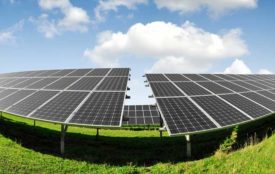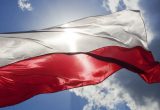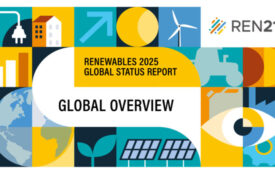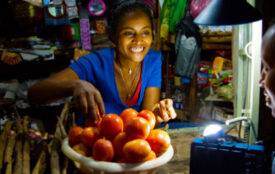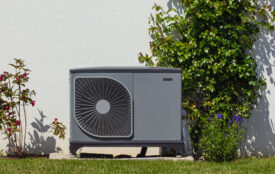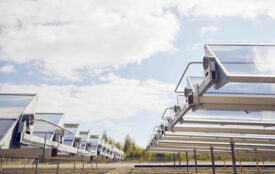West Africa Emerges as Leading Region in Africa for Renewable Energy and Energy Efficiency
Although access to energy services remains severely constrained in the region, renewables and energy efficiency measures contribute to improved access.
The ECOWAS Renewable Energy and Energy Efficiency Status Report, produced collaboratively by REN21 and ECREEE with lead authorship from the Worldwatch Institute, provides a regional perspective on the renewable energy and energy efficiency market and industry development in West Africa.
Launched on November 10, 2014, the report concludes that renewable energy and energy efficiency technologies have rapidly become cost effective solutions for overcoming the diverse energy challenges facing the ECOWAS region (Benin, Burkina Faso, Cabo Verde, Côte d’Ivoire, The Gambia, Ghana, Guinea, Guinea-Bissau, Liberia, Mali, Niger, Nigeria, Senegal, Sierra Leone, and Togo).
“It is clear that the ECOWAS Member States acknowledge the enormous potential that renewables and energy efficiency bring to accelerating energy access and meeting the region’s energy needs,” says Christine Lins, Executive Secretary of REN21. “Through their commitment to developing renewable energy and energy efficiency across the region, ECOWAS Member States have taken a proactive role in ensuring their ability to address current energy sector challenges through the uptake of renewables, while simultaneously building a resilient system that prepares the region to effectively meet future energy needs and ensures sustainable energy access for all.”
The Executive Director of ECREEE, Mahama Kappiah, says that non-availability of reliable and up-to-date energy information in West African countries constrains opportunities for investments in the energy sector. The ECOWAS Renewable Energy and Energy Efficiency Status Report is therefore a “tool to make information on these activities in the ECOWAS region readily available to different stakeholders, as well as to local and global investors, developers, and project promoters by showcasing the ECOWAS region as one of the most active regions in Africa for the promotion of renewables and energy efficiency.”
“This report presents countries undergoing rapid change, including in the energy sector,” says Alexander Ochs, Director of the Worldwatch Institute’s Climate and Energy Program. “While we are witnessing important projects throughout the region, most ECOWAS countries are just starting to make use of the enormous renewable energy potentials at their doorsteps—and on their roofs, too. With national policies and regional cooperation just taking shape, the big renewable energy boom in West Africa is yet to come. An economically, socially, and environmentally prosperous Africa can only be built on the foundation of a sustainable energy system.”
The ECOWAS Renewable Energy and Energy Efficiency Status Report, covers recent developments and trends in the energy sector in the ECOWAS region. It uses up-to-date renewable energy data, provided by network of contributors from and around West Africa, and is targeted at policymakers, industry, investors and civil society to enable them to make informed decisions about the diffusion of renewable energy.By design, the report does not provide any analysis or forecasts.
Some Key Findings:
- As of early 2014, the ECOWAS region had an installed capacity of 39 megawatts (MW) of grid-connected renewable electricity (excluding hydropower). The total installed renewable capacity, including hydro, was 4.8 gigawatts (GW).
- Renewable energy technologies account for an estimated 28.8 percent of the region’s total installed capacity of grid-connected electricity.
- Regional new investment in renewable power and fuels from six leading ECOWAS Member States (Nigeria, Senegal, Ghana, Côte d’Ivoire, Liberia, and Sierra Leone) was USD 29.7 million in 2013, down significantly from the peak of USD 370 million in 2011.
- Guinea-Bissau, Ghana, and Sierra Leone are regional leaders in the contribution of renewables to their final energy consumption—at 30.3 percent, 22.4 percent, and 19 percent, respectively, in early 2014—largely as a result of their use of modern biomass.
- Hydropower accounted for 57 percent of total installed electricity capacity in Ghana; it also played a significant role in Guinea (34.2 percent), Togo (28.8 percent), Côte d’Ivoire (28.2 percent), and Nigeria (16.2 percent). As of early 2014, only 19 percent of the ECOWAS region’s estimated 25 GW of hydropower potential had been exploited.
- Wind energy provided 27 MW of installed electricity capacity, with 25.5 MW of this coming from Cabo Verde’s Cabeolica wind farm, sub-Saharan Africa’s first commercial-scale public-private partnership.
- Cabo Verde leads the ECOWAS region in installed capacity of grid-connected solar photovoltaics (PV), with 6.4 MW. Ghana has an installed capacity of 1.92 MW.
- The region’s use of solar PV technology is limited largely to distributed and off-grid functions. Senegal leads with installed capacity of 21 MW, followed by Nigeria with 20 MW and Niger with 4 MW.
- By the end of 2014, 13 ECOWAS Member States had adopted renewable energy support policies, with all 15 Member States having at least one policy or one target at the national level promoting renewable energy technology development.
- As of early 2014, feed-in tariffs had been adopted by Ghana and Nigeria and were being developed in the Gambia and Senegal. Cabo Verde became the first and only country within the ECOWAS region to adopt net metering.
- As of early 2014, the share of the population using improved biomass cook stoves was 20 percent in the Gambia, 16 percent in Senegal, 10 percent in Sierra Leone, 6 percent in Nigeria, and 2.1 percent inBurkina Faso.
- As of early 2014, eight ECOWAS Member States—Benin, Cabo Verde, The Gambia, Guinea, Mali, Nigeria, Senegal, and Togo—had energy-efficient lighting initiatives.
- Benin, Côte d’Ivoire, and Nigeria have established domestic programs for energy efficiency in the building sector.
Report available:
- ECOWAS Renewable Energy and Energy Efficiency Status Report – pdf
- Regional Status Reports
- ECOWAS Regional Centre for Renewable Energy and Energy Efficiency (ECREEE)

